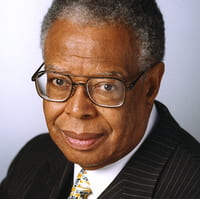
H. Welton Flynn may not have been a San Francisco native, but he was extremely influential in shaping the city’s legacy. Originally from South Carolina, Flynn moved to San Francisco after returning from World War II. He attended Golden Gate College and graduated with a degree in Accounting. He then proceeded to open his own firm in 1949, H. Welton Flynn Accountants and Auditors, now headed by his son, Welton C. Flynn.
Once considered the “New Moscone” by the San Francisco Chronicle, H. Welton Flynn first entered San Francisco’s political scene in the 1960s when he served on San Francisco’s Civil Grand Jury, as well as the San Francisco Committee on Crime. In 1970, Mayor Joseph Alioto appointed Flynn as the first African American commissioner to serve on the Public Utilities Commission. The PUC oversees the distribution and handling of water, wastewater, and electric power supplies of San Francisco, Alameda, San Mateo, and Santa Clara counties. At the time, the PUC also oversaw other public services such as San Francisco’s Municipal Railway (Muni). An advocate of affirmative action, in 1971 Flynn secured funding need to create a pilot program for minority contracting, the first Minority and Disadvantaged Business Enterprise. Nurturing its development, it would become the gold standard for minority contracting. Flynn served on the PUC until 1991 when San Franciscans voted to establish a separate public agency for matters related to Muni. This was the birth of the San Francisco Municipal Transit Authority. H. Welton Flynn was subsequently called upon to lead the SFMTA’s board as its first president. He was also voted in as the first African American chairman for the San Francisco Convention and Visitors Bureau.
Flynn was committed to humanely handling the challenges that faced Muni. For example, when the PUC called for armed Muni cops because of teenage violence on Muni, Flynn sought a different approach. He insisted on spending $2 million on helping disadvantaged teenagers find employment rather than funding a “beefed-up police security force.” Following his proposal, Mayor Moscone announced that $1.6 million would fund crime-fighting programs. Flynn’s advocacy for affirmative action never faded as Muni appointed Curtis E. Green in 1974 as the first African American general manager of a major US transit system.
H. Welton Flynn served on the Public Utilities Commission and for the San Francisco Municipal Transit Authority.
Flynn was also involved in the San Francisco Redevelopment Agency. The agency had reserved two blocks specifically for Flynn and a small coalition of prominent African American investors who operated under the banner of his construction company, Pyramid Development Company. Residents and merchants would be able to buy shares of the new development project, which would become the Fillmore Center shopping complex. This project would impact small business owners in the black neighborhoods. The Western Addition Project Area Committee (WAPAC) led by Arnold Townsend, rose to oppose the new construction, claiming it wouldn’t help the community.
In 1981 San Francisco had a 45 percent minority population. As president of the Black Leadership Forum, Flynn focused on initiating more minority-operated businesses at the airport. It was important to him as Public Utilities Commissioner to have diversity among the contractors and concessionaires at the airport. In his efforts to support minority projects, he approved a proposal submitted by Central City Developers Inc., a minority owned company, to build an eight-story senior citizen apartment complex.
Flynn received many awards during his time in office, though none as special as the dedication of a $26 million, six-acre Muni bus garage located in the Mission District of San Francisco. In 1989 Flynn greeted ceremony attendees and thanked them for having come to witness the grand unveiling of the parking garage, which had been set to open in September of that year.
Flynn was commended for his devotion to public issues and his advocacy for marginalized ethnic and racial groups, specifically in reference to increasing the number of minority hires. H. Welton Flynn passed away on March 21, 2016, and left a legacy that helped craft San Francisco life today.
— Juliet Baires and Vivian Talamantes
Works Cited
“A Six-Acre Tribute.” S.F. Chronicle. 22 Jul 1989, p. C11.
“Added minority role asked for airport.” SF Chronicle. 20 Aug 1981.
“COMTO Mourns the Passing of H. Welton Flynn” Conference of Minority Transportation Officials. 29 Mar 2016.
“Driving Equality.” Market Street Railway. 7 Aug 2008.
King, John “H.W. Flynn New Head of City PUC.” SF Chronicle. 24 Jan 1973, p. 2.
“H. Welton Flynn—longtime civic leader.” SF Chronicle. 28 Mar 2016, p. C4.
Liebert, Larry “Purchase of Site Approved.” SF Chronicle. 2 Jul 1975, p. 9.
“Minority firm to build project.” SF Chronicle. 13 Jun 1983.
“Plan to sell shares in Fillmore center.” SF Chronicle. 18 Aug 1975, p. 12.
“PUC calls for armed Muni cops.” SF Chronicle. 24 Nov 1976.
Watson, Lloyd. “New Chairman for S.F. Convention and Visitors Bureau.” SF Chronicle. 22 May 1992, p. B3.
